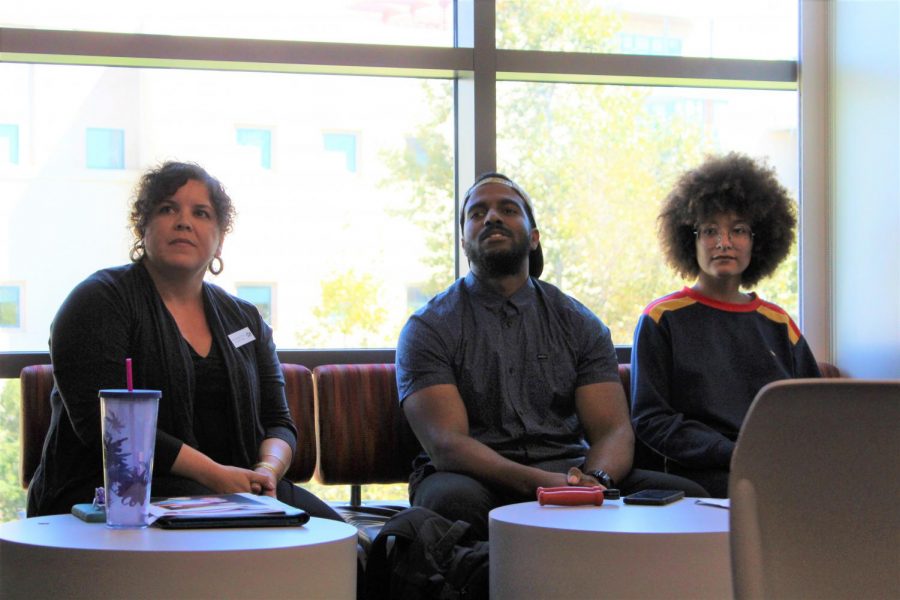Students learn about Afro-Latin@/x identity and community
Dr. Anne Macias (left), Pedro Lebron Guzman III (middle), and Danni Flowers (right) share personal stories about their Afro-Latinx heritage.
Three panelists shared their experiences of being Afro-Latinx with students at the Intersections of Afro-Latin@/x panel.
The Latin@ Center collaborated with the Black Student Union Center to host Intersections of Afro-Latin@/x at the Black Student Union (USU 4200) on Oct. 3 from 12 p.m. to 1 p.m.
Dr. Renzo Lara, the Associate Director of the Latin@ Center, said that Intersections of Afro-Latin@/x, a panel that has been done in previous years between the two centers, was important because it widens “part of our scope of our [Latin@/x] community.”
Intersections of Afro-Latin@/x is also a part of the Latin@ Center’s Celebration Hispanic Heritage Month which is from Sept. 15 to Oct. 15.
The panelists, Dr. Annie Macias, an ASI Executive Director; Pedro Lebron Guzman III, a computer-science major and military veteran and Danni Flowers, a Peer Educator at the Gender Equity Center (GEC) began by speaking about growing up Afro-Latin@/x.
Dr. Macias, who was raised and grew up in Panama said that once she moved to the United States, said she realized that she was considered different than those in the Latinx and black community.
“Wow, I’m not Latina enough for some people and I’m not black enough for some people… the people who don’t really know me when they see me, they don’t really know what to make out, because I speak Spanish and am very light-skinned,” said Dr. Macias.
The panelists also shared about how their appearance has thrown people off and misidentify them.
When asked about what the panelists thought about new identifying terms, such as Afro-Latin@/x, there were varying responses.
“These terms are coming up almost every day now, are very new to me… In terms of me personally, I cannot say I feel any gravity towards how it should mean something,” said Guzman.
Dr. Macias said “I’m excited that these terms exist now, because I think… for younger generations who embrace the terms that say we exist and are we are here and should celebrate who we are and our heritage.”
The panelists also discussed their personal experiences with colorism in the Latinx community. Colorism is defined as discrimination based on skin color.
Flowers, who identifies as a nonbinary pansexual Afro-Latinx person said that they have gone through many painful experiences regarding their identity.
“Last semester, a student told me that I was only one of the female students in the Gender Equity Center that was close to representing a black student and at the time I tried to brush it off, not so much of not having that connection to my Afro-Latinx identity and more so affected by being misgendered,” said Flowers, “but after a while that person didn’t have the right to invalidate me and assume who I am and invalidate my upbringing… it’s hurtful when someone from the same community essentially comes at you like that.”
The panelists also answered questions about people’s assumptions about them as Afro-Latinx people. Both Flowers and Guzman brought up being considered white-washed for not knowing about certain aspects of their culture like knowing Spanish.
“When I tell someone I grew up in a Dominican family they’re like ‘you’re so exotic’ ‘speak Spanish to me’. I was born in Manhattan, I don’t have anything exotic,” said Flowers.
After answering all of the questions that were prepared for them, the panel took questions from students.
Once students asked questions and went over their own experiences as Afro-Latinx people, the panel ended and students were able to grab empanadas and talk to the panelists individually.
Naadiyah Shabdaz, a fourth-year psychology major who attended Intersections of Afro-Latinx, said that she thought the panel “was really good, it was really informative… everyone’s story was different, so that was really cool.”


